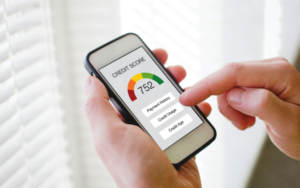 It can be easy to start thinking about your credit score only when you are looking to get a credit card, mortgage or loan. However, we should all view our credit score as something to keep a regular eye on. Reviewing it periodically and taking action to improve it where necessary can make a huge difference. In order to do this effectively, it is important to understand what a credit score is and how it is calculated. In this article, we explain how your credit score works and the steps that you can take to improve it quickly.
It can be easy to start thinking about your credit score only when you are looking to get a credit card, mortgage or loan. However, we should all view our credit score as something to keep a regular eye on. Reviewing it periodically and taking action to improve it where necessary can make a huge difference. In order to do this effectively, it is important to understand what a credit score is and how it is calculated. In this article, we explain how your credit score works and the steps that you can take to improve it quickly.
Check out our Millennial Money video below where Lauren and Damien give 6 top tips on how to improve your credit score.
How to increase your credit score quickly
Some parts of building up your credit score can take a long time and require changing how you spend money. However, there are some quick fixes that can give your credit rating a rapid boost.
1. Avoid hard credit checks
A lender will perform a 'hard' credit check when you apply for a loan or credit card. This leaves a mark on your credit report. Too many marks on your credit report could suggest to lenders that you are desperate for credit.
You do not need to make a full application in order to see if you will be accepted or not. Many lenders offer 'soft' credit checks, which will not leave a mark on your credit history. You can use this to compare deals and find the right provider without risking damaging your credit score.
2. Get on the electoral roll
Registering to vote, even if you have no intention of voting, can provide a huge boost when applying for credit. This is because it is the main way used to confirm you live at the address listed on your application.
If you are ineligible to register to vote, you can request that a note is added to your file to show this by contacting each of the main UK CRAs.
3. Prompt payments
Repaying your debts on time is a great way to boost your credit score and can show lenders that you are a responsible borrower.
Missing repayments – even if you have only forgotten – can have a negative impact on your credit score. Try setting up a direct debit so that the payments leave your account automatically every month.
4. Check your credit report
It is a good idea to regularly check your credit file to make sure the information held is correct and up to date. You have a legal right to see your credit file for free from each of the UK's main CRAs (Experian, Equifax and TransUnion).
If you find any errors, get them amended as soon as possible to help improve your credit score. CRAs have 28 days to respond to a dispute and should be helpful, as keeping your file accurate is a legal requirement.
5. Don't take out any more credit
If you have a low credit score, try to avoid borrowing any more money for a period of time. This includes overdrafts on current accounts. All credit applications are removed from your report after 24 months. This means that taking a break can help you reset your credit score and rebuild your credit history.
6. Pay more than the minimum
Only meeting the minimum monthly payment on a credit card could suggest that you are struggling with money. Paying off the card in full every month – or at least more than the minimum – is a good sign for lenders and could boost your credit score.
7. Avoid people with bad credit
You may not realise that applying for a joint financial product alongside someone with bad credit will affect your own credit score. Even if it is only a joint current account, you will have a financial association with that person on your credit file.
You can ask the three main CRAs dissociate you from anyone you have previously held a financial product with, but no longer have a relationship with. This could be an ex-partner, for example.
8. Maximise your available credit
Try to pay off any other existing loans or credit cards, as keeping your available credit high will help your credit score. Lenders will usually see you using some credit, but not too much, as an indicator you are on top of your finances.
9. Don't take a payment holiday (unless you really need to)
Some lenders will let you take a payment holiday if you are struggling with repayments. This can help you manage a short-term cash squeeze and get yourself back on your feet. However, payment holidays will appear on your credit report (unless they were taken between 17 March 2020 and 31 July 2021).
This could reduce your credit score and potentially make borrowing more difficult.
10. Stick with your oldest current account
Keeping the same current account for a significant period of time can suggest to a lender that you are financially stable. It can be a boost to your credit score, while opening and closing lots of accounts can have the opposite effect.
11. Make sure your name is on your bills
An easy way to build your credit score is to make sure your name is on bills. If you have a joint credit card with your partner, for example, make sure your name is also on the bill. Paying off this card in full every month will help you build a credit history and grow your credit score.
12. Get a credit builder credit card
A low credit score does not necessarily mean you have a poor credit history. A low score could simply be a sign of you not having enough of a credit history for a CRA to assess. This means that building a good credit history is an easy way to boost your credit score.
One of the best ways to build a credit history is through a credit-builder credit card, though you will need to make sure you pay it off in full every month.
13. Register your rent
Consistently paying your rent for a long period of time should show a lender that you are good at meeting regular payments. Unfortunately, it does not automatically appear on your credit report or affect your credit score.
However, you can get the payments added to your credit report through companies like LOQBOX*. Some options will cost you money, so make sure the extra boost to your credit score is worth the extra cost.
Find out which credit card is best for you
Money to the Masses uses Creditec*, an online comparison service that enables you to find credit card deals tailored to you without affecting your credit score. You will want to compare as many different options as possible before you get a new credit card, so it is a good idea to do a fast online comparison. With only a few basic details, the Creditec tool will build a personalised list of credit cards suited to your needs to help you navigate the huge number of options out there. You can then pick the result that suits you best. None of this will affect your credit score as the eligibility process uses a soft credit check. Click here to start your comparison*.
A simple way to improve your credit score for free
LOQBOX* is a free service that allows you to lock money away each month with a view to improving your credit score. Once you have decided on the amount you wish to save each month (Between £20 and £200 a month), LOQBOX will create a 0% loan for the total value. If you were to commit to £20 a month, LOQBOX will create a 0% loan for £240. Each time you pay a monthly repayment, LOQBOX will report it to the three major credit reference agencies, which shows them you can handle credit and in turn should improve your creditworthiness.
Once your 0% loan has been fully settled, your loan can be paid back to you in full, so long as you choose to open a savings account with a bank that LOQBOX has partnered with. LOQBOX earns a referral fee for each new bank account opened and is how it earns money. If you would prefer not to open a new savings account, you can choose to have the money repaid to you directly, but LOQBOX will charge a £30 administration fee (and so you will receive £30 less than you paid in).
Before considering LOQBOX you need to make sure that it is right for you as it is another monthly commitment and so any missed payment could harm your credit history. LOQBOX* does allow you to settle a loan early so long as you contact them first and this will ensure it does not affect your credit history.
If a link has an * beside it this means that it is an affiliated link. If you go via the link Money to the Masses may receive a small fee which helps keep Money to the Masses free to use. But as you can clearly see this has in no way influenced this independent and balanced review of the product. The following link can be used if you do not wish to help Money to the Masses - Loqbox





